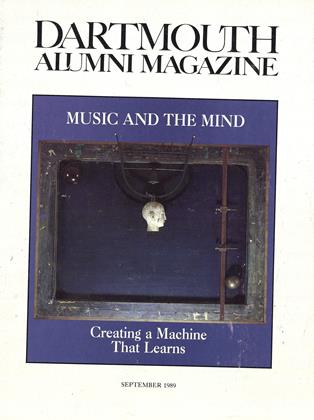This year Transaction Press is reissuing Reuel Denney's 1957 study in popular culture, The Astonished Muse, as one of its "Classics in Communication" series. And this year the University of Hawaii Center for the Humanities has asked the Dartmouth graduate from the class of 1932 to organize and direct the first of its interdisciplinary seminars on animal symbols in American life. Under Denney's direction scholars and artists from the U.S. and abroad will interpret "animal signs" as clues to culture that may be eluding other modes of analysis.
At 76 Denney has not slackened his pace or his interest in all aspects of American life, notably its transition from a work to a leisure society. As a generalist par excellence, his peculiar craft making elegant and incisive sense of our overwhelming trends and complex traditions is fully in practice and more in demand than ever. This despite making his home in paradise at the foot of Diamond Head, where he "retired" from the University of Hawaii and the East-West Center over ten years ago. This followed careers as a poet, coauthor of The Lonely Crowd, editor for Time and Fortune, and teacher at the Universities of Chicago and Hawaii.
"My college studies were a direct track into my later writing, editing, and teaching," he says. "I was a small 15-year-old smartass when I arrived at Dartmouth in the fall of 1928. I escaped being a total loner only through the sympathies of a few 'intellectual' friends, the nurturance of the faculty, and the amused disregard of others. Dartmouth gave me more than I brought to it, and I have always been grateful to it for being willing to view me with suspended judgment. I thought of Dartmouth as a bit unsophisticated. I am now sure it found me so."
Having taught in the University of Chicago college core program, Denney sees present-day Dartmouth to be on a good track in curriculum matters, ters, with appropriate distribution requirements. "David Riesman and Bart Giamatti are right that attempts to generalize such core requirements to all higher education are mischievous. Dartmouth now has a great 'concentration' plan.
"As for curriculum matters today, I was an ambitious dilettante and generalist and amateur when I started out for Dartmouth where I majored in English, taking also courses in Latin, French, Italian, and economics. And I am happy to say that Dartmouth did not divert me onto a more well-traveled road.
"With the disappearance of the old leisure class or those who imitated it on a slim budget, like myself this attitude has become increasingly impossible for the young. What was gained for education in the earlier part of the century by the correction of moralizing criticism in the humanities has now been lost again. Contemporary critics all too often deal with texts as objects of effortful, specialized dissection rather than as sources of pleasure. This arrogance crosses all ideologies and may mean that the humanities, as taught, have joined rational technology and bureaucracy as oppressors of the young mind."
Denney, to report an interesting development, is now at work on his first novel, Albright in Escrow, a bittersweet evocation of the 19505.
 View Full Issue
View Full Issue
More From This Issue
-
 Cover Story
Cover StoryMUSIC AND THE MIND
September 1989 By Jay Heinrichs and Karen Endicott -
 Feature
FeatureA Cure for Nostalgia: the Ultimate Comp Exam
September 1989 By Nancy Staab '90 -
 Feature
FeatureSAILING FOR HOME
September 1989 By Heather Killebrew '89 -
 Feature
FeatureSon of Animal House
September 1989 By Ed. -
 Article
ArticleThe man who wrote the movie returns to find brothers in slime.
September 1989 By Chris Miller '63 -
 Article
ArticleDR WHEELOCK'S JOURNAL
September 1989
Article
-
 Article
ArticleTrustee Meeting
October 1932 -
 Article
ArticleCopland and Henze.
JANUARY 1967 -
 Article
ArticleTHE GRANDMOTHER NEURON
SEPTEMBER 1989 -
 Article
ArticleDon Rease, Act One: "The Double Leo"
APRIL 1997 -
 Article
ArticleThe Undergraduate Chair
November 1946 By CHARLES CLUCAS '44 -
 Article
ArticleGEORGE TICKNOR AND THE COLLEGE LIBRARY
December, 1908 By Sidney B. Fay

